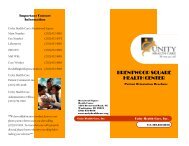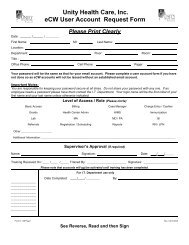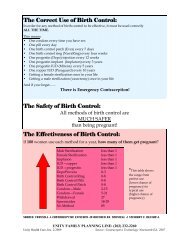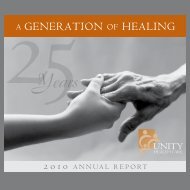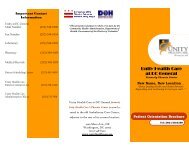A Cycle of Care - Unity Health Care
A Cycle of Care - Unity Health Care
A Cycle of Care - Unity Health Care
You also want an ePaper? Increase the reach of your titles
YUMPU automatically turns print PDFs into web optimized ePapers that Google loves.
The <strong>Unity</strong> program provides a supportive group environment and<br />
shows families how to introduce new habits over time. For example,<br />
they might change from whole to 2 percent milk and then eventually<br />
try skim milk. The group members also support each other through a<br />
range <strong>of</strong> life events.<br />
“Our families also go through a lot <strong>of</strong> instability that makes it temporarily<br />
hard to stay on track,” Wallace adds. “If someone loses their<br />
job, we work through it with them.”<br />
Wallace knows what works with participating families because<br />
the staff tracks results. While not every person has lost weight,<br />
Wallace and her team have seen increases in health behaviors across<br />
the board.<br />
Many participants have made lifestyle changes. For example, on<br />
average, adult participants reported drinking 47 percent less soda<br />
while eating 36 percent more fruit and 40 percent more vegetables.<br />
Adults’ average minutes <strong>of</strong> exercise activity increased 57 percent<br />
while hours <strong>of</strong> television watching decreased 29 percent. Children<br />
reported similar changes — an average 62 percent decrease in soda<br />
consumption, 69 percent increase in vegetable consumption, and 30<br />
percent increase in daily physical activity time.<br />
In addition, some participants made dramatic transformations in<br />
their weight. On average, child participants maintained stable body<br />
mass index (BMI) percentiles, avoiding a trend <strong>of</strong> weight gain over<br />
time. Some individual children lost weight as appropriate. Average<br />
adult BMI averages decreased slightly, but some adult participants<br />
lost more than 40 pounds. One diabetic participant improved her<br />
health enough to manage her diabetes without medication.<br />
Based on these successes, <strong>Unity</strong>’s We Can! program staff was invited<br />
to the White House to meet with First Lady Michelle Obama to<br />
discuss the program’s approach to preventing childhood obesity.<br />
In addition, the National Association <strong>of</strong> Community <strong>Health</strong> Centers<br />
(NACHC) presented the 2009 Innovative Research in Primary <strong>Care</strong><br />
Award to Wallace, Katz, and Rosché. The award recognized the<br />
success <strong>of</strong> We Can! in connecting with patients, improving health<br />
knowledge, and encouraging behavior changes that promote good<br />
health.<br />
“We applaud <strong>Unity</strong> for focusing on long-term changes that will<br />
improve their patients’ health and quality <strong>of</strong> life,” says Tom Van<br />
Coverden, president and CEO, NACHC. “They are using data to track<br />
progress <strong>of</strong> their We Can! participants and identify the approaches<br />
that have the greatest success — and then implementing the program<br />
in ways that make it inviting and effective for their patients.”<br />
Keeping up with demand<br />
<strong>Unity</strong>’s We Can! program expanded in response to what patients<br />
wanted — a longitudinal program instead <strong>of</strong> a four-week curriculum.<br />
As a result, each week’s activities have to be different, so Wallace<br />
and her team search for innovative approaches to teach about<br />
healthy eating and active living as well as partners who can add<br />
something new.<br />
For example, the Sister to Sister Foundation, which focuses on<br />
women’s heart health, supported a series <strong>of</strong> four classes that<br />
culminated in a Bike for the Heart event in DC. The organization<br />
donated healthy snacks, coordinated speakers on preventing heart<br />
disease, provided tickets and transportation to a Washington Mystics<br />
game, and gave scooters and helmets to children who completed the<br />
classes and participated in the biking event.<br />
“And even the Mystics game was an opportunity to learn about<br />
healthy eating,” Wallace recalls. “We chose the healthiest sporting<br />
event food and talked about how to find the healthiest options<br />
wherever you are.”<br />
2008 AND 2009 annual reports 5



